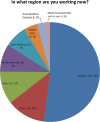Plastic Surgery Training across Seven Continents: Results from the First Global Trainee Survey
- PMID: 36225841
- PMCID: PMC9542936
- DOI: 10.1097/GOX.0000000000004520
Plastic Surgery Training across Seven Continents: Results from the First Global Trainee Survey
Abstract
Little is known about the demographics and ambitions of plastic surgery trainees and if these differ between regions. This study sought opinion from current and recently graduated plastic surgery trainees to map demographics, training structure, and ambitions of plastic surgery trainees worldwide.
Methods: A cross-sectional study was designed and administered by the international trainee organization International Confederation of Societies of Plastic Surgery Trainees. A questionnaire of 45 questions was distributed digitally through several international channels using the REDCap platform.
Results: A total of 290 junior plastic surgeons, of whom 124 (42.8%) were women, from all seven International Confederation of Societies of Plastic Surgery regions, participated in this study. Of the trainees, 21% have emigrated, and 75% expressed a desire to undertake a part of their training abroad. The most common length of training in plastic surgery is 5 years. There is a difference in working hours between regions, where more than 80-hour work weeks are most common in Asia (24.1%), and work weeks of less than 40 hours are most common in Middle East (30.8%). A majority of trainees (85%) reported a research interest, and we found a negative correlation between the extent of research ambition and reported clinical workload.
Conclusions: We present here the first international investigation of trainee experiences of plastic surgery training. We show that training structure and organization vary between institutions, and that plastic surgery trainees report a strong interest in international training as well as in research.
Copyright © 2022 The Authors. Published by Wolters Kluwer Health, Inc. on behalf of The American Society of Plastic Surgeons.
Figures
References
-
- Chen K, Ha G, Schultz BD, et al. . Is there gender inequality in plastic surgery? Evaluation of society leadership and composition of editorial boards. Plast Reconstr Surg. 2020;145:433e–437e. - PubMed
-
- Fisher M, Alba B, Duvvuri P, et al. . The state of plastic surgery education outside of the operating room. Plast Reconstr Surg. 2020;146:1189–1194. - PubMed
LinkOut - more resources
Full Text Sources

